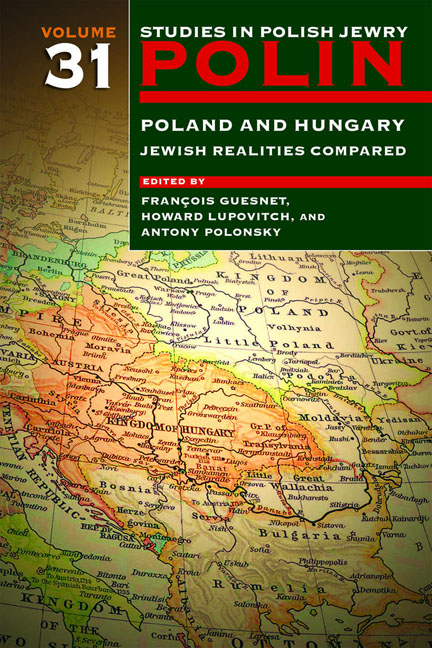Book contents
- Frontmatter
- Dedication
- Editors and Advisers
- Preface
- Polin
- Polin: Studies in Polish Jewry
- Contents
- Note on Place Names
- Note on Transliteration
- Part I POLAND AND HUNGARY: JEWISH REALITIES COMPARED
- JEWISH ACCULTURATION AND INTEGRATION
- JEWISH RELIGIOUS LIFE
- JEWS IN POPULAR CULTURE
- THE INTERWAR YEARS
- THE HOLOCAUST AND ITS AFTERMATH
- PERSONAL REFLECTIONS
- Part II NEW VIEWS
- Part III OBITUARIES
- Notes on the Contributors
- Index
Polish Hasidism and Hungarian Orthodoxy in a Borderland: The Munkács Rabbinate
- Frontmatter
- Dedication
- Editors and Advisers
- Preface
- Polin
- Polin: Studies in Polish Jewry
- Contents
- Note on Place Names
- Note on Transliteration
- Part I POLAND AND HUNGARY: JEWISH REALITIES COMPARED
- JEWISH ACCULTURATION AND INTEGRATION
- JEWISH RELIGIOUS LIFE
- JEWS IN POPULAR CULTURE
- THE INTERWAR YEARS
- THE HOLOCAUST AND ITS AFTERMATH
- PERSONAL REFLECTIONS
- Part II NEW VIEWS
- Part III OBITUARIES
- Notes on the Contributors
- Index
Summary
KÁRPÁTALJA AS A BORDERLAND
It is possible to
have been born in Austria-Hungary,
have been married in Czechoslovakia,
have given birth in Hungary,
have lived with your family in the Soviet Union,
reside currently in Ukraine,
… and have never left the city of Mukachevo.
This sign describing the twentieth-century vicissitudes of one town in Zakarpats’ ka—as the area in Ukraine is known today—used to hang on the wall of the University of Southern California Shoah Foundation. Yet even before the twentieth century, Jewish communities in the region were embedded in an environment of shifting borders, changing political realities, and varying cultural influences.
Kárpátalja (Carpathian Ruthenia) lies to the north and east of the Hungarian plain, and continues northward to the Carpathian Mountains. Munkács (Mukachevo) lies below the Carpathians, on the edge of the Tysa lowlands. Geographically situated on the perimeter of empires, Carpathian Ruthenia served as a crossroads between states and can be considered a ‘borderland’. The term ‘borderland’ refers to a loosely defined region that is significantly affected by a border. Borderland scholars have called for the area on both sides of a border to be considered as a unit of analysis. I am suggesting that Carpathian Ruthenia be considered a borderland because it has consistently existed on the borders between empires, kingdoms, or states.
Physical location at the periphery does not necessarily entail intellectual isolation. From a Jewish perspective Munkács served as a meeting point for different ideas. While borderland studies can help frame the Munkács experience, a useful metaphor is a catchment basin: that is, an area of convergence—not of water but of ideas and ideologies. While borderlands are generally perceived as spaces of transit, a catchment area is primarily a place of collection. Thus Munkács experienced lapping networks as well as unique social dynamics and cultural development.
My frame for viewing intellectual trends and the movement of ideas with migration departs from two prevalent meta-narratives in scholarship on Hungarian Jewry. One narrative focuses on the distinction between ‘Oyberland’ and ‘Unterland’, envisaging a porous internal border within Hungary. Oyberland communities in the west of Hungary were populated by Jews who migrated from German-speaking lands: they were generally wealthier, tended towards modernity, and were educated in secular studies.
- Type
- Chapter
- Information
- Polin: Studies in Polish Jewry Volume 31Poland and Hungary: Jewish Realities Compared, pp. 199 - 224Publisher: Liverpool University PressPrint publication year: 2018



